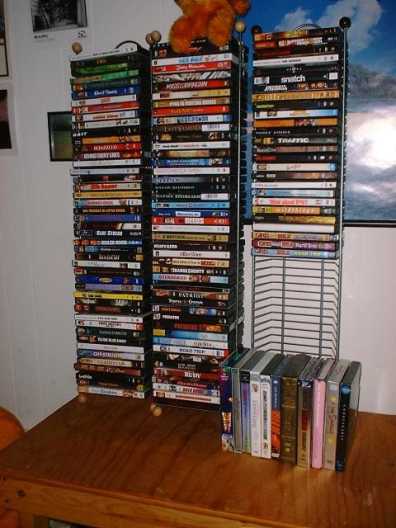Signs were there that DVD sales were about to implode; industry ignored all warnings
To anyone in the newspaper industry, the parallels are eerie. The disruptive technology is introduced, and people with the ability to look beyond this quarter’s P&L statement say, “Oh-oh. Something’s in the wind. We gotta take a look at this, maybe start shifting some resources into R&D, or we could blow up in a couple years.”
 To which the guys at the top of the company, whose fat year-end bonuses are tied to keeping costs to a bare minimum, while sucking off as much spare cash as possible, say, “You’re out of your mind. Things are going great. You wanna break them? Siddown and shut up – we know what we’re doing – look at all the money we’re making. Instead, we’re going to double down on our bets, and buy up & consolidate our monopolistic position.”
To which the guys at the top of the company, whose fat year-end bonuses are tied to keeping costs to a bare minimum, while sucking off as much spare cash as possible, say, “You’re out of your mind. Things are going great. You wanna break them? Siddown and shut up – we know what we’re doing – look at all the money we’re making. Instead, we’re going to double down on our bets, and buy up & consolidate our monopolistic position.”
And then the day arrives. The P&L shows a massive die-off in the one area that the whole house of cards depends on as a crucial revenue stream.
The guys at the top immediately point fingers at the internet & start screaming.
That day arrived last week at Sony Pictures, and The Media Wonk has a great write-up, running down all the relevant stats and the various time-wastes along the way. He points fingers at Blu-Ray as a massive time, money & effort Black Hole that hasn’t stepped up to replace the revenues that are being lost via plain old DVD sales going bye-bye. Viz:
The need for a viable post-DVD digital strategy has been blindingly obvious for most of the past decade. But instead of focusing on that existential challenge, the industry wasted four years on Blu-ray, an absurd format that addressed no identifiable consumer demand that could not have been met years earlier, more cheaply and with less consumer confusion with readily available alternatives, like HD DVD or even red-laser DVDs.
The industry is still wasting time and resources trying to invent uses for Blu-ray to justify the time and cost sunk into it.
Hitting the snooze button when the alarm goes off doesn’t mean that what happens in the meantime is beyond your control. It means you’re asleep.
If I can extrapolate from the behavior I’ve witnessed in my friends, some of whom are the greatest TV & movie aficionados I’ve ever met; the type of people who can go one for an hour about how David Duchovny’s characterization of Fox Mulder owed more to John Wayne in The Searchers than, as is commonly (and erroneously) thought, the seminal Darren McGavin in Kolchak: The Night Stalker.
When DVDs came out, they were such an improvement over the jittery, fragile VHS tapes that we loaded up on them. All the extras – the audio tracks, the Easter Eggs – oh, they were sah-weet. We’d have parties where we’d go through our favorite movies and break it all down – because now, when we freeze-framed, it was a perfect picture, not that damned bent image with static bars at the top & bottom, the way VHS shafted us.
And then something happened. We had a whole shelf – maybe a coupla shelves. Maybe even a whole room – full of DVDs. Alphabetized, categorized.
And we didn’t watch them anymore.
Why should be drag out a DVD, fire up the player, switch the Video1 to Video2 – just to sit through something we’ve already seen … when the TiVo has something fresh & new? There has to be a real dearth of new material that’s any good before we’ll go to the archives for some nostalgia.
The success of the studios & networks in setting up all these TV channels & alternative means of distribution of content has also been its undoing. If I don’t have to shell out $24 for a movie – when I can just stream it over Netflix, or better yet, see something new on my DVR – then why would I spend my increasingly scarce hard-earneds?
Technology alone didn’t change consumer behavior. It wasn’t the internet’s fault. It’s just that when alternatives opened up – when true competition arrived on the market – all of a sudden, the old Walled Gardens, with their high price to enter and their restrictive DRM – those places became not so fun to hang out it. So we all left. Gradually, but in increasing numbers.
The crisis that newspapers have faced for the last 5-10 years — the TV and movie industry is about to fall into that same Black Hole, for the same reasons, and apparently is determined to attempt the same half-measures to turn the clock back to where it used to be. Look for a lot of appeals to Congress for restrictive legislation, blaming “piracy” and “content thieves,” and then resorting to a death spiral of cutting costs and putting out shoddier products.

